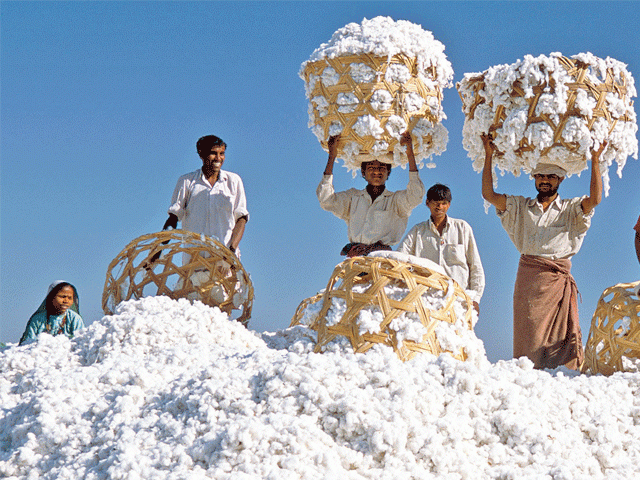Cotton production in Pakistan has seen a sharp decline, with total arrivals down 36.84% year-over-year, according to the latest data from the Pakistan Cotton Ginners Association (PCGA).
As of November 1, 2024, arrivals totaled 4,291,105 bales, a stark drop from last year’s 6,794,006 bales.
Punjab recorded a 38.53% decrease in output, with 1,842,257 bales produced compared to 2,996,921 bales last year.
Sindh saw a 35.51% reduction, producing 2,448,848 bales, down from 3,797,085 bales in 2023. Balochistan’s production, meanwhile, stands at 131,800 bales.
Sajid Mahmood, Head of the Technology Transfer Department at the Central Cotton Research Institute in Multan, attributed the decline to a combination of adverse weather, pest attacks, and inadequate research funding.
He highlighted that erratic weather patterns—such as unusually low temperatures in February and March, followed by excessive heat in May and June—disrupted germination and growth.
While optimal soil temperatures for early sowing should be around 20°C, temperatures this year dipped below 15°C during critical early growth phases, impacting yields.
Additionally, heavy monsoon rains damaged vast cotton acreage across Punjab and Sindh, while pest infestations, particularly from whitefly and pink bollworm, further decreased output. Intense summer temperatures, which peaked at felt temperatures of 54°C, further hindered crop growth.
A significant barrier to effective pest and crop management has been the chronic underfunding of cotton research. Mahmood noted that since 2016, the Pakistan Central Cotton Committee (PCCC) has faced a funding shortfall due to withheld cotton cess payments from the textile industry, crucial for financing research. This funding gap has impeded the development of high-yield, disease-resistant cotton varieties, putting the sector’s sustainability at risk.
On the other hand, a shortfall in quality cotton is forcing textile mills to temporarily shut their production activities.
On November 1, Janana De Malucho Textile Mills Limited (JDMT) announced to halt its production due to challenging economic conditions, rising power costs, and a shortage of affordable and high-quality cotton.
Earlier on October 29, Ghazi Fabrics International Limited, a Pakistani exporter of fabric to Europe, the USA, and the Far East, partially halted production activities in its weaving plant, citing challenging economic conditions, soaring power costs, and a shortage of affordable, high-quality cotton.




